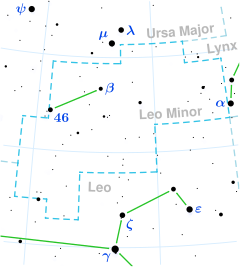42 Leonis Minoris
| Observation data Epoch J2000 Equinox J2000 | |
|---|---|
| Constellation | Leo Minor |
| Right ascension | 10h 45m 51.8947s[1] |
| Declination | +30° 40′ 56.307″[1] |
| Apparent magnitude (V) | 5.35±0.01[2] |
| Characteristics | |
| Spectral type | B9 V[3] |
| U−B color index | −0.16[4] |
| B−V color index | −0.06[4] |
| Astrometry | |
| Radial velocity (Rv) | 12±3.7[5] km/s |
| Proper motion (μ) | RA: −20.344 mas/yr[1] Dec.: −38.234 mas/yr[1] |
| Parallax (π) | 7.915 ± 0.0813 mas |
| Distance | 412 ± 4 ly (126 ± 1 pc) |
| Absolute magnitude (MV) | +0.02[6] |
| Details | |
| Mass | 2.77±0.36[7] M☉ |
| Radius | 3.29±0.11[7] R☉ |
| Luminosity | 107[8] L☉ |
| Surface gravity (log g) | 4±0.2[9] cgs |
| Temperature | 10,703±206[7] K |
| Rotational velocity (v sin i) | 145[10] km/s |
| Age | 69+199 −59[9] Myr |
| Other designations | |
| Database references | |
| SIMBAD | data |
42 Leonis Minoris (42 LMi) is a solitary,[11] bluish-white hued star located in the northern constellation Leo Minor. It has a visual apparent magnitude of 5.35,[2] allowing it to be faintly seen with the naked eye. Parallax measurements place it at a distance of 412 light years.[1] The object has a heliocentric radial velocity of 12 km/s,[5] indicating that it is drifting away from the Solar System.
42 LMi has a general stellar classification of B9 V,[3] indicating that it is an ordinary B-type main-sequence star. However, Cowley et al. (1969) gave a slightly cooler class of A1 Vn,[12] indicating that it is instead an A-type main-sequence star with 'nebulous' (broad) absorption lines due to rapid rotation. Nevertheless, it has 2.77 times the mass of the Sun and a radius of 3.3 R☉.[7] It radiates at 107 times the luminosity of the Sun[8] from its photosphere at an effective temperature of 10,703 K.[7] Its high luminosity and slightly enlarged diameter suggests that the object might be evolved. Like most hot stars, 42 LMi spins rapidly with a projected rotational velocity of 145 km/s.[10]
There are two optical companions located near this star. BD+31°2181 is a 7th magnitude K2 giant star separated 146″ away along a position angle of 174°.[13] An 8th magnitude companion has been detected at a distance of over 400 arcseconds along a position angle of 92°.[13] Both have no relation to 42 LMi and is just moving with it by coincidence.
An X-ray emission with a luminosity of 278.2×1020 W has been detected around the object. A-type stars are not expected to emmit X-rays, so it must be coming from an unseen companion.[14]
References[edit]
- ^ a b c d Brown, A. G. A.; et al. (Gaia collaboration) (2021). "Gaia Early Data Release 3: Summary of the contents and survey properties". Astronomy & Astrophysics. 649: A1. arXiv:2012.01533. Bibcode:2021A&A...649A...1G. doi:10.1051/0004-6361/202039657. S2CID 227254300. (Erratum: doi:10.1051/0004-6361/202039657e). Gaia EDR3 record for this source at VizieR.
- ^ a b Høg, E.; Fabricius, C.; Makarov, V. V.; Urban, S.; Corbin, T.; Wycoff, G.; Bastian, U.; Schwekendiek, P.; Wicenec, A. (March 2000). "The Tycho-2 catalogue of the 2.5 million brightest stars". Astronomy and Astrophysics. 355: L27–L30. Bibcode:2000A&A...355L..27H. ISSN 0004-6361.
- ^ a b Osawa, Kiyoteru (July 1959). "Spectral Classification of 533 B8-A2 Stars and the Mean Absolute Magnitude of a0 V Stars". The Astrophysical Journal. 130: 159. Bibcode:1959ApJ...130..159O. doi:10.1086/146706. eISSN 1538-4357. ISSN 0004-637X.
- ^ a b Crawford, D. L. (February 1963). "U, b, v, and Hβ Photometry for the Bright B8- and B9-TYPE Stars". The Astrophysical Journal. 137: 530. Bibcode:1963ApJ...137..530C. doi:10.1086/147526. eISSN 1538-4357. ISSN 0004-637X.
- ^ a b Kharchenko, N.V.; Scholz, R.-D.; Piskunov, A.E.; Röser, S.; Schilbach, E. (November 2007). "Astrophysical supplements to the ASCC-2.5: Ia. Radial velocities of ~55000 stars and mean radial velocities of 516 Galactic open clusters and associations". Astronomische Nachrichten. 328 (9): 889–896. arXiv:0705.0878. Bibcode:2007AN....328..889K. doi:10.1002/asna.200710776. ISSN 0004-6337.
- ^ Anderson, E.; Francis, Ch. (May 2012). "XHIP: An extended hipparcos compilation". Astronomy Letters. 38 (5): 331–346. arXiv:1108.4971. Bibcode:2012AstL...38..331A. doi:10.1134/S1063773712050015. eISSN 1562-6873. ISSN 1063-7737. S2CID 119257644.
- ^ a b c d e Stassun, Keivan G.; et al. (9 September 2019). "The Revised TESS Input Catalog and Candidate Target List". The Astronomical Journal. 158 (4): 138. arXiv:1905.10694. Bibcode:2019AJ....158..138S. doi:10.3847/1538-3881/ab3467. eISSN 1538-3881.
- ^ a b McDonald, I.; Zijlstra, A. A.; Watson, R. A. (15 June 2017). "Fundamental parameters and infrared excesses of Tycho–Gaia stars". Monthly Notices of the Royal Astronomical Society. 471 (1): 770–791. arXiv:1706.02208. Bibcode:2017MNRAS.471..770M. doi:10.1093/mnras/stx1433. eISSN 1365-2966. ISSN 0035-8711.
- ^ a b Gullikson, Kevin; Kraus, Adam; Dodson-Robinson, Sarah (25 July 2016). "The Close Companion Mass-ratio Distribution of Intermediate-mass Stars". The Astronomical Journal. 152 (2): 40. arXiv:1604.06456. Bibcode:2016AJ....152...40G. doi:10.3847/0004-6256/152/2/40. eISSN 1538-3881.
- ^ a b Dworetsky, Michael M. (November 1974). "Rotational Velocities of A0 Stars". The Astrophysical Journal Supplement Series. 28: 101. Bibcode:1974ApJS...28..101D. doi:10.1086/190312. eISSN 1538-4365. ISSN 0067-0049.
- ^ Eggleton, P. P.; Tokovinin, A. A. (11 September 2008). "A catalogue of multiplicity among bright stellar systems". Monthly Notices of the Royal Astronomical Society. 389 (2): 869–879. arXiv:0806.2878. Bibcode:2008MNRAS.389..869E. doi:10.1111/j.1365-2966.2008.13596.x. eISSN 1365-2966. ISSN 0035-8711.
- ^ Cowley, A.; Cowley, C.; Jaschek, M.; Jaschek, C. (April 1969). "A study of the bright stars. I. A catalogue of spectral classifications". The Astronomical Journal. 74: 375. Bibcode:1969AJ.....74..375C. doi:10.1086/110819. ISSN 0004-6256.
- ^ a b Mason, Brian D.; Wycoff, Gary L.; Hartkopf, William I.; Douglass, Geoffrey G.; Worley, Charles E. (December 2001). "The 2001 US Naval Observatory Double Star CD-ROM. I. The Washington Double Star Catalog". The Astronomical Journal. 122 (6): 3466–3471. Bibcode:2001AJ....122.3466M. doi:10.1086/323920. ISSN 0004-6256.
- ^ Schröder, C.; Schmitt, J. H. M. M. (24 September 2007). "X-ray emission from A-type stars". Astronomy & Astrophysics. 475 (2): 677–684. Bibcode:2007A&A...475..677S. doi:10.1051/0004-6361:20077429. eISSN 1432-0746. ISSN 0004-6361.

